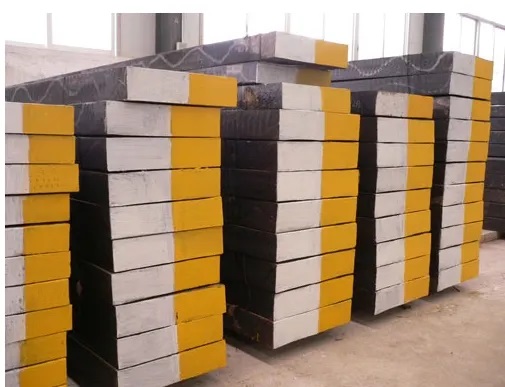S7 Tool Steel
One. Product Description
S7 Tool Steel is an impact resistant tool steel with excellent toughness and high strength with moderate wear resistance. It has maximum shock resistance and high compressive strength, giving it good resistance to deformation in use while maintaining good toughness. S7 tool steel is easy to machine in the annealed condition and easy to heat treat. It can be quenched in air and exhibits minimal deformation when hardened. S7 tool steel also has moderate hot workability, making it a versatile tool steel for hot and cold shock applications as well as plastic molds that require high hardness.
Two. Quality Standard
ASTM A681-08 Standard Specification
Three. Product Specifications

Four. Equivalent Grade of S7 Tool Steel - For Reference Only
|
|
China GB |
US ASTM |
Germany DIN |
EU EN |
|
S7 |
5Cr3Mn1SiMo1V |
S7 |
1.2355 |
50CrMoV13-15 |
Five. Product Features and Uses
Features:
1. High toughness.
2. Good wear resistance.
3. High impact resistance.
4. Good hardenability.
5. Good machinability.
6. Excellent polishability.
7. Good dimensional stability when hardened.
Use:
S7 tool steel has an unusual combination of properties that make it suitable for an extremely wide range of tool and mold machining - where impact resistance, moderate hot workability or ease of machining and heat treatment are paramount.
Recommended for hot and cold shock applications such as rivet sets, chisels, punches, mole points, hot heads and fixture molds. S7 tool steel is also suitable for small batch molds used in cold forming, blanking and bending. Other uses include: engraving molds, machined cavities for plastic forming molds, mold casting molds, shear blades and main hobs.
Six. Product Detailed Information
S7 tool steel has an unusual combination of properties that make it suitable for an extremely wide range of tool and mold machining - where impact resistance, moderate hot workability or ease of machining and heat treatment are paramount.
Recommended for hot and cold shock applications such as rivet sets, chisels, punches, mole points, hot heads and fixture molds. S7 tool steel is also suitable for small batch molds used in cold forming, blanking and bending. Other uses include: engraving molds, machined cavities for plastic forming molds, mold casting molds, shear blades and main hobs.
Smelting Scheme
1.EAF: Electric arc furnace.
2.EAF+LF+VD: refining-vacuum degassing.
3.EAF+ESR: Electroslag Remelting.
4.EAF+PESR: protective atmosphere electroslag remelting.
5.VIM+PESR: vacuum induction melting.
Forming Scheme
1. Hot rolling process.
2. Hot forging, electro-hydraulic, high-speed hydraulic, hydraulic, precision forging.
Heat Treatment Plan
1.+A: Annealing (full/soft/spheroidized).
2.+N: Normalization.
3.+NT: normalizing and tempering.
4.+QT: Conditioning (water/oil).
Operability
Forging: Uniformly heated and forged from temperatures in the 1950/2050°F (1066/1121°C) range. Do not continue forging below 1700°F (927°C), but reheat as often as necessary. Small simple forgings can be slowly cooled in dry lime, ash or other insulating materials. The best practice for large forgings is to place them in a furnace heated to about 1400°F (760°C), soak them evenly at this heat, then turn off the heat and allow the forgings to cool in the furnace. This is not annealing, the forgings must be properly annealed after cooling.
Machinability: The machinability of Carpenter S7 alloys can be rated as approximately 75/80% of 1% carbon tool steel or approximately 50/55% of B1112. When using high speed cutting tools, a turning speed of approximately 85/90 surface feet per minute (0.48/0.56 m/s) is recommended.
Heat treatment
Annealing: Heat to 1550°F (840°C), hold for 2 hours, slowly cool to 1000°F (540°C) at a maximum rate of 50°F (30°C)/hour, air cool. Or heat to 1550°F (840°C) for 2 hours, cool to 1400°F (760°C) for 4 hours, then air cool to room temperature.
Typical Annealed Hardness: 187/220 BHN.
Annealed Material: Heat to 1200/1250°F (650/675°C) for two hours and cool in still air.
Hardened Material: Heat to 25°F (15°C) below original tempering temperature for two hours and cool in still air.
Preheat: Heat to 1250°F and hold at this temperature until fully submerged.
Hardening: Heat to 1725 to 1750°F, soak for 45 to 60 minutes per inch of thickness. Dimensions less than 1 inch thick should hold for at least 45 to 60 minutes.
Quenching: Air quenched sections can be up to 2-1/2 inches thick in still air. Quenched to 150°F. Temper immediately after quenching in all cases.
Temper: A double temper is a must. For each temper, soak for two hours per inch of thickness, air cooling to room temperature between tempers. For cold work applications, the normal tempering range is 400 to 500°F. For hot work applications, a tempering temperature of 900 to 1000°F is recommended. Never temper S7 tool steel below 400°F.
Quenching: Vacuum furnace with sufficient overpressure, forced air or gas.
Horse tempering bath at 360–480°F (180–250°C) followed by air or oil cooling (large cross section).
NOTE: Quenching in oil increases the risk of dimensional changes and cracks, temper the tool once it reaches a temperature of 120–160°F (50–70°C).
Tempering:S7 tool steel is typically tempered for 1.5 to 2 hours per inch of maximum cross section. Tempering temperatures vary depending on the intended use. For cold working and similar applications, a tempering temperature of 400°F is recommended. For hot working applications, a tempering temperature of 900 to 1000°F is recommended. Never temper below 400°F.

























